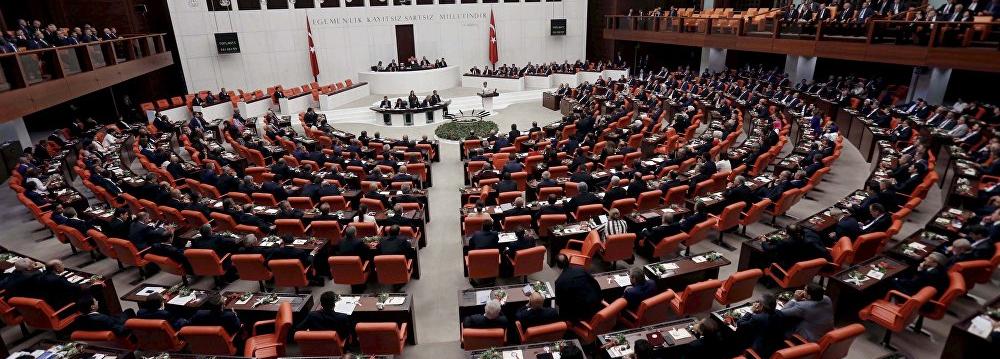On Monday, Turkey’s Parliament began debating a package of constitutional amendments aimed at empowering President Recep Tayyip Erdogan while 11 opposition members remain in jail.
In a letter to the parliament’s presidency, the imprisoned co-leader of the opposition Peoples’ Democratic Party (HDP), Selahattin Demirtas called the convention of the parliament without him and his 10 other colleagues “controversial, illegitimate and illegal”, Kurdistan24 reported.
Demirtas said he and his colleagues in jail were “political hostages” whose right to express themselves and vote were physically usurped, according to the HDP website that shared the letter from a prison in the northwestern city of Edirne.
As lawmakers started discussing the bill, scores of protestors, including MPs from the main secularist opposition Republican People’s Party gathered outside the parliament to protest Against Erdogan.
Turkish police cracked down on the protestors, using pepper spray, pressurized water and dogs.
Speaking to the parliament, HDP lawmaker Sirri Sureyya Onder said debating a constitutional change extending powers of the president while several lawmakers are in prison was unconstitutional.
Other HDP MPs live-streamed Onder’s speech online as the state TV did not air the parliamentary proceedings.
According to Deputy Prime Minister Nurettin Canikli, a referendum will take place in May once the package is passed by the parliament as expected in about a fortnight.
Erdogan Closer to Increased Executive Power
The Turkish Parliament has voted to advance a bill on constitutional reform that would allow President Erdogan to stay in office until 2029.
Under the proposed far-reaching changes to the executive branch of government, the power to appoint and dismiss government ministers would become the purview of the president rather than the prime minister.
The reform would also allow Erdogan to become leader of the ruling party while in office again, and possibly stay in power for another 12 years.
Erdogan’s ruling AK party argues that Turkey’s current fragile security situation needs strong leadership, but opponents have voiced fears about the authoritarian nature of the bill.
The reform legislation must be supported by at least 330 of the 550 members of the assembly to go to a nationwide referendum, expected in the spring.
Overnight on Monday’s initial vote, 480 representatives voted, 134 of whom were against advancing the bill. Discussions on the proposed law’s content are expected to continue until January 24.
President Erdogan has steadily consolidated his control of Turkey’s branches of government since his election in 2014.
There has been a particular crackdown on members of the opposition, academics, journalists and rights activists since a failed military coup in July last year, after which the government declared a state of emergency.


